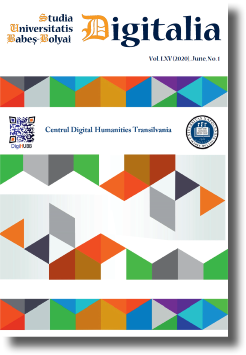DECISION MAKING IN SMART SUPPLY CHAINS: A CASE STUDY ON THE ENERGY INDUSTRY
DOI:
https://doi.org/10.24193/subbdigitalia.2018.1.02Keywords:
supply chain, decision support, software agents, maximum expected utility, petroleum industryAbstract
The dynamic economic environment is driving the evolution of traditional supply chains toward a connected, smart, and highly efficient supply chain ecosystem. Algorithms become powerfull tools that enable machines to make autonomous decisions in the digitized supply chain of the future. The present paper proposes an decision making mechanism for smart supply chain management in the petroleum industry. This industry has a strategic position as it is the base for other essential activities of the economy of any country. The petroleum industry is faced with volatile feedstock costs, cyclical product prices and seasonal final products demand. The current paper considers the position of a refinery as it is at the middle of the integrated petroleum supply chain, between the upstream and downstream. It procures crude oil from upstream assessing the price, quality, timing, and distance to the refinery in order to decide the optimal acquisition. Additionally, the refiner has to carefully monitor the price risk and manage the inventory. The manufacturing activities of the refiner requires thoroughly planning and scheduling the production levels and supply chains for all the derivates and feedstocks for petrochemical industry using tools for decision making in order to estimate market opportunities and threats under volatile market conditions.
In order to provide a reliable and practical decision making model, the current paper proposes a mechanism for decision support under uncertainty using maximum expected utility.
References
Covaci, F.L., 2017. A Multi-Agent Negotiation Support System for Supply Chain Formation. Stuttgart, s.n.
J. Cerquides, U. Endriss, A. Giovannucci, J.A. Rodriguez-Aguilar, 2003. Bidding languages and winner determination for mixed multi-unit combinatorial auctions. s.l.:IJCAI, Morgan Kaufmann Publishers Inc.
M. Winsper, M. Chli, 2013. Decentralized supply chain formation using max-sum loopy belief propagation. s.l.: Computational Intelligence.
M. Winsper, M. Chli, 2012. Using the max-sum algorithm for supply chain formation in dynamic multi-unit environments. s.l.: Proceedings of the 11th International Conference on Autonomous Agents and Multiagent Systems.
M. Winsper, M. Chli, 2010. Decentralised supply chain formation: A belief propagation-based approach. s.l.: Agent-Mediated Electronic Commerce.
Manzano, F. S., 2000. Supply Chain Practices in the Petroleum Downstream. In: Supply Chain Practices in the Petroleum Downstream. s.l.: Massachusetts Institute of Technology.
Profesional Logistics Group, 2013. Oil&Natural Gas: The Evolving Freight Transportation Impacts. La Quinta, CA, s.n.
R.Hussain, T. Assavapokee, B. Khumawala, 2006. Supply Chain Management in the Petroleum Industry: Challenges and Opportunities. International Journal of Global Logistics & Supply Chain Management, 1(2), pp. 90-97.
T. Penya-Alba, M. Vinyals, J. Cerquides, J.A. Rodriguez-Aguilar, 2012. A scalable Message-Passing Algorithm for Supply Chain Formation. s.l., 26th Conference on Artificial Intelligence.
W. E. Walsh, M.P. Wellman, F. Ygge, 2000. Combinatorial auctions for supply chain formation. s.l.:Proceedings of the 2nd ACM conference on Electronic commerce.
W.E Walsh, M.P. Wellman, 2003. Decentralized supply chain formation: A market protocol and competitive equilibrium analysis. s.l.: Journal of Artificial Intelligence Research.
Downloads
Published
How to Cite
Issue
Section
License
Copyright (c) 2018 Studia Universitatis Babeș-Bolyai Digitalia

This work is licensed under a Creative Commons Attribution-NonCommercial-NoDerivatives 4.0 International License.


